|
|
|
Sort Order |
|
|
|
Items / Page
|
|
|
|
|
|
|
| Srl | Item |
| 1 |
ID:
190773
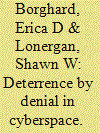

|
|
|
|
|
| Summary/Abstract |
Many scholars and practitioners are unconvinced that cyber deterrence is possible. This article aims to demonstrate why some of this skepticism is misplaced, as well as provide greater clarity and conceptual rigor to the proliferation of arguments within the United States about deterrence in cyberspace. Specifically, we argue that cyber deterrence frameworks that draw from the traditional nuclear deterrence literature and the logic of deterrence by punishment are mismatched to deterrence challenges in cyberspace. Instead, we advocate for a deterrence by denial approach, but one that is oriented around counter-cyber operations rather than simply improving defenses. While there has been some scholarship and work by practitioners that implicitly rests on a deterrence by denial logic, they suffer from a lack of systematic assessment of how traditional denial concepts, especially those developed in the conventional deterrence literature, could be extended to cyberspace. Therefore, in this article, we review different deterrence concepts in theory and practice, articulate a logic of cyber deterrence by denial, and provide policy recommendations for the United States.
|
|
|
|
|
|
|
|
|
|
|
|
|
|
|
|
| 2 |
ID:
190776


|
|
|
|
|
| Summary/Abstract |
How do foreign fighters affect militant group behavior? Recent studies have examined the impact of foreign fighters on broader conflict outcomes, but we explore their specific impact on group behavior. Using foreign fighter data, we find that the presence of foreign fighters is positively related to group longevity, use of suicide operations, and the geographic spread of its operations. We elaborate on these findings in a case study of foreign fighters in al-Shabaab. This article provides important contributions to both scholarship and policy, elucidating the ideological and logistical impact of foreign fighters on tactics, target choices, and group lifespan.
|
|
|
|
|
|
|
|
|
|
|
|
|
|
|
|
| 3 |
ID:
190775
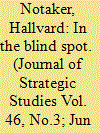

|
|
|
|
|
| Summary/Abstract |
Situational awareness in the face of hybrid campaigns is undermined by ‘blind spots’, which this article conceptualises. Blind spots are where legal or political frameworks preclude intelligence gathering below the threshold of war. Drawing on a historical case study of alterations in legislation and security police directives in Norway from 1950–2021, the analysis shows how an influence operation’s blind spot varied along with shifts in the balance between national security concerns and democratic individual rights. Recent initiatives to criminalise domestic collaboration with foreign influence operators are discussed, and the advent of AI and microtargeting presented as a challenge out of reach of such legislation.
|
|
|
|
|
|
|
|
|
|
|
|
|
|
|
|
| 4 |
ID:
190778
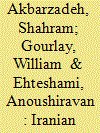

|
|
|
|
|
| Summary/Abstract |
This article examines Iran’s ‘forward-defence’ strategy, in particular its deployment of proxy forces in the Syrian conflict. Iran’s expanded presence in regional conflicts is regarded by its adversaries as indication of hegemonic intent, while Tehran posits its regional posture as a defensive response to security threats. We argue that Iran’s ‘forward-defence’ strategy offers practical benefits, shaping strategic realities, and performative benefits, allowing Tehran to propagate a discourse of military fortitude. On balance, however, the strategy has fed suspicions of Iran’s intentions and increased hostility towards the Iranian leadership, thus is likely to be counterproductive.
|
|
|
|
|
|
|
|
|
|
|
|
|
|
|
|
| 5 |
ID:
190774
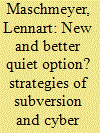

|
|
|
|
|
| Summary/Abstract |
Theorizing on cyber conflict has moved from warfare to conflict short of war, but strategic thought has not kept pace. This article argues cyber conflict is subversive, builds on intelligence scholarship to identify strategies of subversion, and examines their applicability in cyber conflict. It distinguishes three subversive strategies: manipulation, erosion and overthrow. The analysis shows cyber operations can only implement one of these strategies (erosion), indicating they offer less strategic value than traditional counterparts. Accordingly, although cyber operations offer superior scale, I argue their scope of influence is more limited. Finally, the article discusses strategic implications and identifies possible counterstrategies.
|
|
|
|
|
|
|
|
|
|
|
|
|
|
|
|
| 6 |
ID:
190772
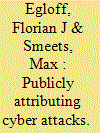

|
|
|
|
|
| Summary/Abstract |
When should states publicly attribute cyber intrusions? Whilst this is a question governments increasingly grapple with, academia has hardly helped in providing answers. This article describes the stages of public attribution and provides a Public Attribution Framework designed to explain, guide, and improve decision making of public attribution by states. Our general argument is that public attribution is a highly complex process which requires trade-offs of multiple considerations. Effective public attribution not only necessitates a clear understanding of the attributed cyber operation and the cyber threat actor, but also the broader geopolitical environment, allied positions and activities, and the legal context. This also implies that more public attribution is not always better. Public attribution carries significant risks, which are often badly understood. We propose the decision maker’s attitude towards public attribution should be one of ‘strategic, coordinated pragmatism’. Public attribution – as part of a strategy – can only be successful if there is a consistent goal, whilst the avenues for potential negative counter effects are assessed on a case-by-case basis.
|
|
|
|
|
|
|
|
|
|
|
|
|
|
|
|
| 7 |
ID:
190777


|
|
|
|
|
| Summary/Abstract |
Why do jihadi foreign fighters leave local insurgencies? While the literature on jihadi foreign fighters has mushroomed over the last decade, it has largely covered the perspective of individual motivations to join jihadi foreign fighter groups. The critical question of why individual jihadi foreign fighters leave local insurgencies, de facto recognizing the failure of their initial motives to join a distant armed conflict, has remained understudied. Drawing on the case study of Russo-Chechen wars, this article shows that a combination of popular hostility, loss of status, and poor living conditions urged jihadi foreign fighters to abandon local armed conflict.
|
|
|
|
|
|
|
|
|
|
|
|
|
|
|
|
|
|
|
|
|